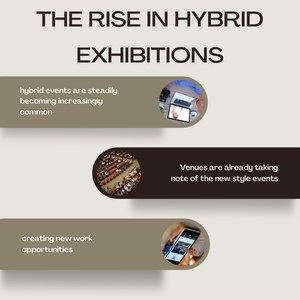Crowd-Pulling Secrets: How to Turn Passers-By Into Fans at Your Next Event You’ve booked the…
The Rise in Hybrid Exhibitions
 New style hybrid exhibitions and conferences are emerging in the wake of the pandemic, and are set to pose new challenges for organisers.
New style hybrid exhibitions and conferences are emerging in the wake of the pandemic, and are set to pose new challenges for organisers.
Hybrid events combine both physical and virtual reality/online events. Most recently, the Oscars, Emmy Awards and Grammy Awards combined both in-person and streaming online and for the first time, had made it possible for virtual guests to actually be part of the ceremony. Equally notable was the Swedish band ABBA’s comeback tour. Although the tour took place in actual theatres, the band themselves were not present, preferring instead to use artificial intelligence to provide hologram representations of themselves on stage. It was the perfect way to avoid international travel problems.
Such hybrid events are steadily becoming increasingly common. Even smaller events such as Ågri-tech are incorporating some form of virtual reality participation. Participants unable to get to the actual venue for whatever reason could access many of the day’s events onscreen as they happened
There are definite advantages to running hybrid events. It provides access to a much wider audience, including people who might not otherwise have visited it. Disruptions in international travel can be avoided while international delegates can still take part. It is also a good way of reducing costs for visitors who might be travelling long distance. Obviously, hybrid events are an answer to health & safety concerns at a time when viruses are all too prevalent.
Venues are already taking note of the new style events. Newcastle/Gateshead Convention Bureau is one such venue working with clients to deliver hybrid events that can involve both visitors and speakers being in different cities while attending the same event.
The rise of hybrid events poses new challenges for the events and conference industry. Running a hybrid event doesn’t mean simply adding a virtual or streaming element to a physical event.
Programmes have to be equally suitable for both in person and virtual attendees, providing on demand content that can be explored at leisure as well as workshops, seminars and talks. Sessions have to be shorter since virtual attendees have lower attention spans as they are confined to a computer screen. A key issue emerging is the need for closer co-ordination of Q&A, ensuring that virtual attendees have exactly the same opportunity to ask questions.
It is actually creating new work opportunities. The virtual element needs people in place to monitor transmissions, ensure that all goes smoothly and that communication links are permanently maintained throughout the event. Already industry experts are recommending that organisers should have a separate event co-ordinator focusing on the virtual attendees, ensuring that everything goes smoothly, dealing with problems and organising networking opportunities.
Individual companies exhibiting or taking part in conferences and major events also have to bear in mind the changing demands of hybrid events. Stand staff may need to co-ordinate appointment lists, monitor links and deal with any basic queries online as well as in person. Data collection tasks may well have to be widened to include information about attendees exploring a company’s stand on a virtual basis.



